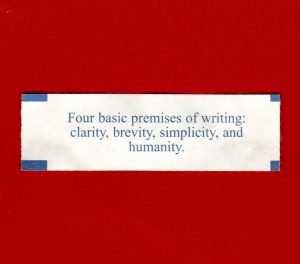Fortune Cookie Friday: On Writing Well

I always enjoy getting a fortune about writing. They give you advice in a simple, short format. Most of my library on writing is full of fat books that, to be honest, I don’t refer to as often as I should. Today’s fortune is a quote by William Zinsser, an American writer, editor, literary critic, and teacher. It also reminds me to use these principles whenever I write.
Clarity
The main purpose of writing is to communicate. Therefore, your writing should be clear. It is easy to write long-winded sentences and stuff them full of unnecessary words. You may feel tempted to use complicated words that make you sound “smart.” Instead, write from the point of view of your reader.
Some suggestion on how to improve your clarity:
- Write short, declarative sentences. Never use a long word where a short one will do.
- Be specific, and use plain English.
- Choose pronouns wisely, and don’t be afraid to use “me.”
- Use active instead of passive voice, whenever you can.
Passive voice is a common trap. It weakens the sentence. Try to use active voice as much as possible, with the subject acting upon the verb, rather than being acted upon.
Example:
Passive: The photo was taken by Charlotte.
Active: Charlotte took the photo.
Brevity
[themify_quote]There’s not much to be said about the period except that most writers don’t reach it soon enough. – William Zinsser[/themify_quote]
Get straight to the point. Don’t add fluff. If you’re writing a lot of words, it probably means that there is not enough substance, and you are dancing around the topic. This shows up a lot when there is a desired word count.
Simplicity
If you can find a shorter word, use it. If the sentence reads the same without a word, scrap it. Your writing should be easy for your reader to understand.
Humanity
Remember that you are writing to someone. There is a person on the receiving end of the communication. Put some feeling into your writing, we aren’t robots. The writing should touch upon human emotions so that your reader can connect with you.
When in doubt, before you write, take a deep breath. Think about what you want to say knowing you only have the length of that breath to say it. Then, imagine how you want your reader to feel after you say it. You will be surprised that you only need a few words to get across a complex idea.
One of my favorite examples of using the four premises is writing, “I love you.”




